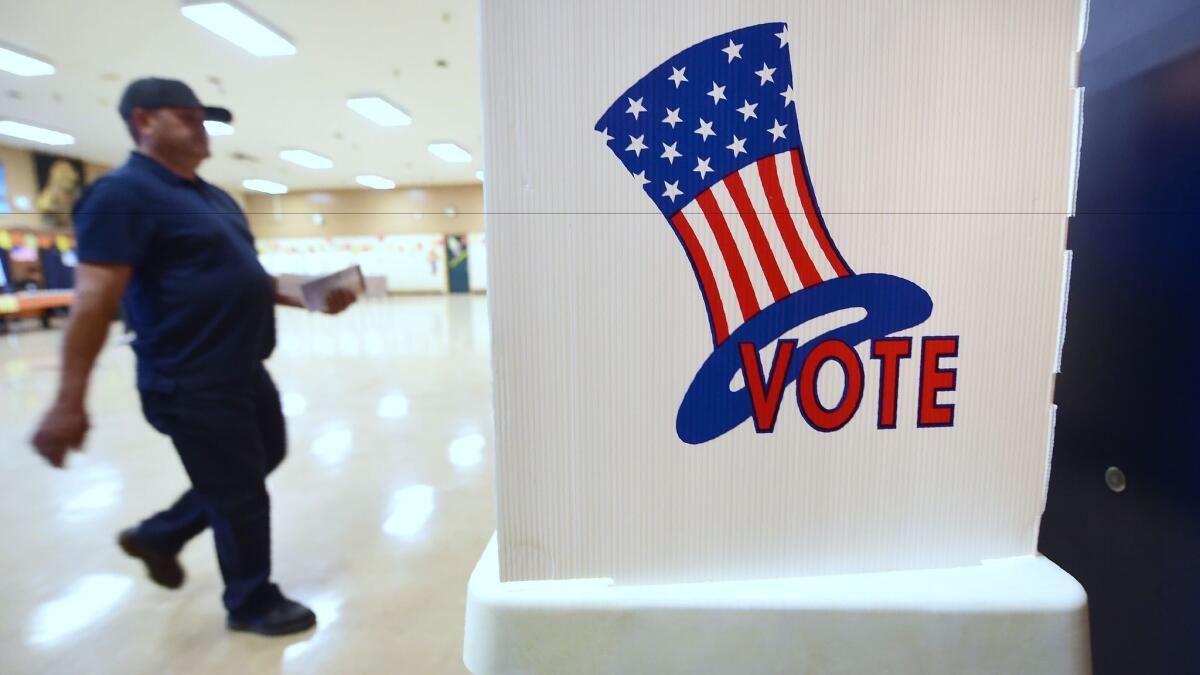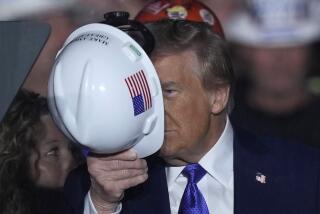Column: Political Road Map: The only thing ‘special’ about California special elections is the cost to taxpayers

- Share via
Democracy won’t come cheap in Los Angeles in 2017. Voters from Boyle Heights to Eagle Rock will likely vote twice — after two earlier elections last year — to fill a single seat in the U.S. House of Representatives, with the final ballots costing county taxpayers more than $1.3 million to cast and count.
Welcome to the latest installment of the ongoing California soap opera known as special elections.
This episode begins with former Sen. Barbara Boxer’s decision to retire in 2016, leading to the election of Sen. Kamala Harris. When she gave up her post as state attorney general, Gov. Jerry Brown chose Los Angeles Rep. Xavier Becerra as her replacement.
And to fill Becerra’s seat, Brown must call a special election in the 34th Congressional District. We’ll get to the timing of that election in a moment.
The common sense meaning of the word “special” is to describe something that, at the very least, is unusual. But there have been 50 special legislative or congressional elections in California in the last decade, according to state records. Thirteen contests were held in 2013 — more than any single year for almost the last quarter-century.
While the elections themselves are no longer special, the costs to conduct them are almost always a surprise to the counties that must pay for them.
Meet the first 11 candidates who entered the race to replace Rep. Xavier Becerra »
Dean Logan, the registrar of voters for Los Angeles County, said his $1.3-million estimate for the election to replace Becerra doesn’t factor in what happens if the winner is a sitting legislator.
“The congressional contest could result in a legislative vacancy, which starts the whole process over again,” he said.
In all, Logan’s office conducted 23 special elections from 2008 to 2015. The total cost: $22.7 million.
And that brings us back to the timing of Becerra’s resignation from Congress. The veteran Democratic congressman chose to remain in his current job until confirmed by the Legislature, going so far as to take the oath of office last week on Capitol Hill, though approval by Democrats in Sacramento is all but a done deal.
That late action means, thanks to the timeline set out in California election law, the primary in this congressional special election can’t be consolidated with a scheduled countywide election on March 7. And with a dozen declared candidates, the likely runoff to replace Becerra may miss the chance to be conducted at the same time as Los Angeles’ May 16 city election.
And then there’s this: Special elections have some of the lowest voter participation rates in California history. Two years ago, a special election for a state Senate seat in the high desert north of Los Angeles saw just 6.2% of eligible voters cast ballots.
Even so, efforts to change things have fizzled. In 2014, a proposal to allow the governor to fill most vacancies by appointment failed to win over legislators — some of whom had won special elections. In 2015, lawmakers rejected a plan to require the state to pay for special elections.
And so the saga continues. It will be worth watching just how many of the 306,631 voters in Becerra’s congressional district show up to select his replacement this winter and spring. After all, they’re paying for it.
Follow @johnmyers on Twitter, sign up for our daily Essential Politics newsletter and listen to the weekly California Politics Podcast
ALSO:
Political Road Map: The California Republican brand has become radioactive with voters
Political Road Map: Revamped primaries changed state politics, but not like many expected
Updates on California politics
More to Read
Get the L.A. Times Politics newsletter
Deeply reported insights into legislation, politics and policy from Sacramento, Washington and beyond. In your inbox twice per week.
You may occasionally receive promotional content from the Los Angeles Times.











